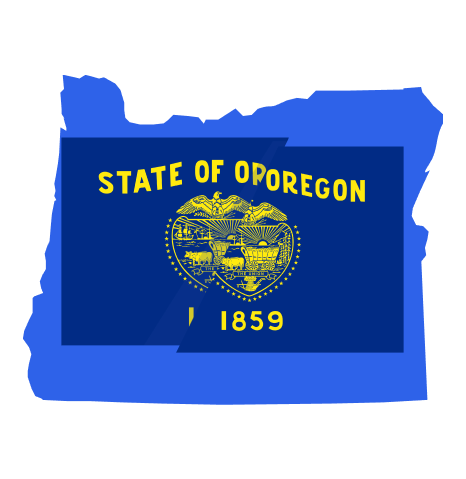Introduction
Recently, the Governor of Oregon signed the Oregon Consumer Privacy Act (OCPA) into law, which is a significant step forward in protecting privacy rights and data protection. This new legislation will have a major impact on how personal data is handled and protected in Oregon. The OCPA was signed into law on July 18, 2023, and it places Oregon among the states with comprehensive laws for consumer data privacy. It is worth noting that the OCPA will not go into effect until July 1, 2024, so businesses covered by the act will have time to ensure compliance with its provisions.
Key provisions of OCPA
The Oregon Consumer Privacy Act (OCPA) marks a crucial step towards safeguarding the privacy of consumers’ personal data. This act sets forth comprehensive guidelines for the collection, processing, and selling of consumer’s personal data in the state of Oregon.
Scope and applicability
The Oregon Consumer Privacy Act (OCPA) is a comprehensive data privacy law that applies to businesses operating in Oregon. It requires businesses to comply with various data privacy regulations, regardless of their size or location. The scope of OCPA extends to a wide range of sectors, including healthcare and finance, among others. This law is designed to protect the personal data of Oregon residents and ensure that businesses are held accountable for their data processing practices.
Consumer rights
The implementation of the Oregon Consumer Protection Act (OCPA) has bestowed consumers with a multitude of fundamental rights pertaining to the safekeeping and usage of their personal data. Among these rights, individuals are now entitled to access, delete, and opt-out of data collection, enabling them to maintain greater control over the dissemination of their personal information. This crucial development has ushered in a new era of data privacy and protection, ensuring that individuals can exercise their rights to the fullest extent possible.
Sensitive data
The Oregon Consumer Protection Act (OCPA) is a comprehensive legislation that outlines the exact specifications for sensitive and derived data, including genetic and biometric data. These types of data require a higher level of security and consent from the concerned individuals. The OCPA aims to protect the privacy and confidentiality of this personal information to prevent any unauthorized use or disclosure. It is imperative to abide by the regulations set forth by the OCPA to ensure the safety and protection of sensitive data.
Data protection assessment
As per the OCPA, it is mandatory for businesses to carry out thorough data protection assessments. This measure is aimed at preventing any fraudulent activities that may compromise the security of sensitive data. Additionally, it promotes transparency in business operations, ensuring accountability and ethical practices. Businesses that adhere to these guidelines and maintain data protection assessments can safeguard the privacy of their customers and maintain their trust while also avoiding any legal consequences.
OCPA requires controllers to perform and document data protection assessments before engaging in activities that pose a great danger of harm (e.g., processing personal data for the purpose of targeting advertising, processing sensitive data, selling personal data, and using personal data purely for business purposes). Explicit consent is required in cases where new purposes may be imposed beyond what has already been disclosed.

Non-discrimination
It is important for businesses to uphold the principles of the OCPA by not discriminating against consumers who choose to exercise their rights. This includes treating all customers equally by providing the same level of service and pricing, regardless of their personal beliefs or preferences. By taking these measures, businesses can ensure that they are operating in a fair and just manner and that they are meeting the needs and expectations of all their customers.
Enforcement by the attorney general
It is crucial to understand that the Oregon Consumer Protection Act (OCPA) falls under the jurisdiction of the state’s attorney general. This means that any violation or non-compliance with the OCPA is the sole responsibility of the attorney general’s office to take legal action as per the law’s provisions. It is essential for both individuals and businesses operating in Oregon to adhere strictly to the OCPA regulations to avoid any legal consequences.
Penalties for violations
Failure of assumed business to comply with the provisions of the Oregon Consumer Protection Act (OCPA) may lead to severe consequences in the form of penalties. These penalties can be quite substantial and may reach up to $7,500 per violation. It is essential to adhere to the requirements of the OCPA to avoid any legal implications and ensure that your business operates within the bounds of the law.
Definition of “sale” of personal data
The selling of Personal Data is defined as a sale between the controller and a third party. Compared to Virginia, e.g., the USA defines a sale “as merely the sale of personal information for money”. The definition of “selling personal data,” a sale, as defined in the OCPA or other State Privacy Regulations, is important because it relates to the processing activity that a consumer has the right to withdraw from (and includes targeting advertising and some type of profile).
Privacy notices
Like all state privacy legislation, it is required that controllers indicate in their privacy notes what is expressly required in relation to the use of the information that the controller collects from its customers. The privacy notices OCPA requires are more detailed than in most states, however. The privacy notice also requires the name of the controller to be a registered business name and the assumed business name a registered company uses in Oregon. OCPA requires that information concerning your identity has reasonable, clear, and meaningful meaning.
Exemptions
It is crucial to bear in mind that the Oregon Consumer Privacy Act (OCPA) has specific exemptions in place. For example, data that is subject to the Gramm-Leach-Bliley Act and any personal data controlled under the Health Insurance Portability and Accountability Act (HIPAA) are exempt from the OCPA. Therefore, businesses that handle these types of data must comply with the regulations outlined in the aforementioned acts instead.
The OCPA is similar in many ways to other state privacy laws in the U.S., such as the California Consumer Privacy Act (CCPA) and the Virginia Consumer Data Protection Act (VCDPA). It aims to enhance consumer data privacy and give individuals more control over their personal information.

Implications for businesses
The OCPA imposes stringent responsibilities on businesses operating in Oregon. It’s crucial for businesses to understand how this law impacts their operations, particularly in the context of processing sensitive data and targeted advertising. Here are some additional implications beyond the key provisions mentioned earlier:
Compliance costs: Businesses will need to allocate resources to ensure compliance with OCPA requirements. This includes the cost of updating privacy policies, implementing data security measures, and potentially hiring or training staff for compliance-related tasks.
Data mapping and inventory: Companies will need to conduct thorough data mapping and inventory to understand what personal data they collect, process, and store. This is essential for complying with transparency and data minimization requirements.
Data handling practices: Businesses will need to review and potentially revise their data handling practices to align with OCPA requirements. This includes implementing data minimization practices, which may require changes in data collection and retention policies.
Opt-out mechanisms: Companies must establish mechanisms for consumers to opt-out of the sale of their personal information. This may require adjustments to data sharing and marketing practices.
Data security measures: Strengthening data security measures is essential to prevent data breaches, as the OCPA imposes penalties for non-compliance. Businesses may need to invest in cybersecurity technologies and practices.
Legal and compliance teams: Establishing or enhancing legal and compliance teams within the organization may be necessary to oversee OCPA compliance, respond to consumer requests, and address any potential legal issues.
Record-keeping: Maintaining records of data processing activities and compliance efforts is crucial. These records may be required to demonstrate compliance in case of regulatory inquiries or legal actions.
Vendor management: If businesses share data with third-party vendors, they must ensure that these vendors also comply with OCPA requirements. This involves contract reviews and potential renegotiations with vendors to include data protection clauses.
Consumer requests handling: Developing processes to efficiently handle consumer requests, such as data access and deletion requests, is important. This requires creating a system to verify consumer identities and respond within specified timeframes.
Training and awareness: Training employees, on OCPA compliance and privacy best practices, is essential to prevent negligent violations and ensure a culture of data protection within the organization.
Risk management: Businesses should conduct risk assessments to identify and mitigate potential privacy and data security risks, which can help avoid costly data breaches and legal consequences.
The OCPA places significant responsibilities on businesses to protect consumer privacy and data. Compliance efforts may require investments in technology, personnel, and procedural changes. However, taking proactive steps to comply with the OCPA can also enhance consumer trust and demonstrate a commitment to data privacy, which can be a competitive advantage in today’s privacy-conscious market.
Conclusion
Oregon’s Consumer Privacy Act (OCPA) broad scope and its strict provisions make it a leader among state privacy laws, providing consumers with necessary safeguards for their personal data. To ensure compliance and safeguard consumer privacy, businesses operating within Oregon must thoroughly acquaint themselves with OCPA’s intricacies and adapt their practices accordingly before the OCPA goes into effect on July 1, 2024.
It is important for businesses to stay up-to-date with the ongoing evolution of data privacy laws in Oregon to maintain compliance with this essential legislation. By doing so, they can effectively navigate the complex landscape of data protection and maintain the trust of their customers.
OCPA’s comprehensive approach to privacy protection requires businesses to take a proactive role in safeguarding their customers’ personal data, including implementing robust security measures and providing clear disclosures about data collection and usage practices. With OCPA’s stringent requirements, businesses can confidently prioritize their customers’ privacy and maintain a strong reputation in the marketplace.







